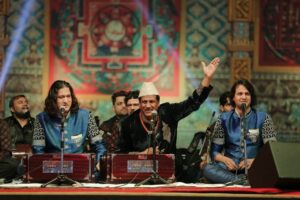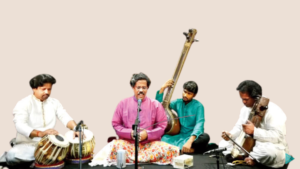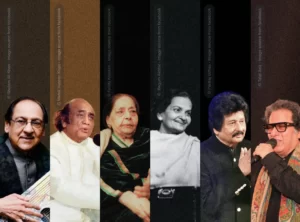Folk Singing: The Heartbeat of the Land
Immerse in the Rustic Rhythms and Timeless Tales of Folk Music
Folk singing is the musical expression of a region’s soul, encapsulating the stories, traditions, and emotions of its people. Our folk singers are the bearers of this heritage, offering performances that are as authentic as they are enchanting.
Why Folk Singing Strikes a Chord:
- Storytelling: Folk songs are narratives set to melody, often telling tales of love, life, and the land, connecting the audience to the roots of the culture.
- Diverse Styles: Each region’s folk music has its own distinct style, instruments, and dialect, offering a variety of sounds and stories to explore.
- Community Spirit: Folk singing is about community and shared experiences, often inviting audience participation, making it a unifying and interactive experience.
- Cultural Preservation: By booking folk singers, you’re not just entertaining guests; you’re also helping to keep alive a vital part of cultural heritage.
Our Folk Singers Our artists come from various folk traditions, from the Bauls of Bengal to the Gondhalis of Maharashtra, each with their own unique style and repertoire. They are not just performers but also cultural ambassadors, bringing the essence of their homeland to your event.
Ideal for Any Occasion Folk singing can add a touch of authenticity to cultural festivals, corporate events, private parties, and educational programs. It’s a way to travel through music to the heart of a culture.
Book a Folk Singing Performance Bring the vibrant spirit of India’s diverse folk traditions to your event with Directainment. Contact us to arrange a performance that will provide a rich, immersive musical experience for your guests.
Indian folk music is as diverse as the country’s cultures and languages. Each region has its own distinct folk music tradition, often reflective of the local history, geography, and cultural practices. Here’s a list of various types of folk singing found across India:
- Bhangra: A lively form of music and dance that originated in the Punjab region.
- Ghazal: Though it has classical roots, it’s often included in folk traditions for its poetic and romantic elements.
- Bhavageethe: Literally meaning ’emotion poetry’, it’s a form of expressive poetry and light music in Karnataka.
- Lavani: A genre of music and dance from Maharashtra known for its powerful rhythms and quick tempo.
- Dandiya: Associated with the dance form of the same name from Gujarat, it’s often played during Navratri.
- Rajasthani Folk: Includes various styles like Manganiyar, Kalbelia, and Langas singing, which are unique to the Rajasthan region.
- Baul: The Bauls of Bengal are a group of mystic minstrels known for their unique spiritual songs.
- Bihu: From Assam, this is a form of folk music associated with the Bihu festival, celebrating the Assamese New Year.
- Garhwali and Kumaoni: Folk music from the Garhwal and Kumaon regions of Uttarakhand.
- Kashmiri Folk: Reflective of the rich cultural heritage of the Kashmir Valley.
- Maand: A sophisticated form of folk singing from Rajasthan, often associated with the royal courts.
- Nautanki: A traditional operatic theatre form from Uttar Pradesh, which includes musical performances.
- Pandavani: A narrative folk form from Chhattisgarh, recounting tales from the Mahabharata, with musical accompaniment.
- Qawwali: A form of Sufi devotional music popular in the Indian subcontinent.
- Tappa: Originated from the Punjab, characterized by a fast, rhythmic tempo and considered a form of classical music that has influenced folk traditions.
- Villu Paatu: A traditional bow song from Tamil Nadu, where the singer uses a bow as a primary musical instrument.
- Jhumair and Domkach: Folk songs from Jharkhand and parts of West Bengal, often sung during harvests and festivals.
- Gondhal: A ritualistic form of singing in Maharashtra, performed during auspicious occasions and festivals.
- Jaunsari: The folk songs from the Jaunsar-Bawar region of Uttarakhand, which have a unique blend of cultural influences.
- Kajri: Originating from the Mirzapur-Banaras region of Uttar Pradesh, these songs are often sung during the monsoons.
- Tamang Selo: This music from the Nepali community has a rhythm that reflects the heartbeat of the Tamang people.
- Haryanvi Ragini: A traditional form of music from Haryana, often involving poetic duels between performers.
- Koli: Folk music of the Koli fisherfolk community in Maharashtra, known for its lively rhythms and dance.
- Punjabi Tappe: A form of Punjabi folk music characterized by its lyrical beauty and rhythmic patterns, often sung at weddings.
- Kajari: Originating from the eastern parts of Uttar Pradesh and Bihar, these are monsoon songs that express longing in separation.
- Sohar: Traditional songs sung in the northern parts of India during childbirth.
- Chaiti: Folk songs sung in the Hindu calendar month of Chaitra, which corresponds with the start of the summer season, popular in Uttar Pradesh and Bihar.
- Alha: A ballad genre from Madhya Pradesh and Uttar Pradesh, recounting the tales of bravery.
- Pabuji Ki Phach: A Rajasthani folk music genre, which is a narrative of the folk deity Pabuji.
- Dollu Kunitha: A drum dance accompanied by singing, from Karnataka.
- Thiruvathira: Associated with the festival of the same name in Kerala, performed by women during the month of Dhanu.
- Padayani: One of the oldest folk dance and music traditions of Kerala, associated with temple festivals.
- Pandun Ka Kada: A storytelling form from Rajasthan, involving singing and dialogue recitation.
- Biraha: A form of folk singing from Uttar Pradesh and Bihar, often involving themes of separation.
- Jangam Katha: Narrative singing by the Jangam community, a Shaivite sect in Karnataka.
- Oppari: A lamentation form of singing from Tamil Nadu, traditionally performed during funerals.
- Bhatiali: Boat songs from Bengal, reflective of the rhythms of oars in the rivers.
- Sambalpuri: Folk music from the Sambalpur region of Odisha, known for its rhythmic complexity and energetic performances.
- Lavani: A genre of music and dance from Maharashtra known for its powerful rhythms and quick tempo.
- Dhunuchi Naach: A dance accompanied by folk music, performed during Durga Puja in West Bengal.
- Wangala: A festival of the Garo tribe of Meghalaya, accompanied by traditional music and dance.
- Ho: Tribal songs from the Ho tribe of Jharkhand, often sung during agricultural activities.
- Santhali Music: From the Santhal tribe of West Bengal, Jharkhand, Odisha, and Assam, known for its syncopated rhythms and dance.
- Maach: Narrative folk theatre from Madhya Pradesh that combines storytelling with music.
- Fag: A genre of folk music from Rajasthan, performed during the festival of Holi.
- Kummi: A traditional folk dance and song form from Tamil Nadu, performed by women during festivals.
- Ghumura: A war dance and music genre from Odisha, with a distinctive drum as the primary instrument.
- Yakshagana: A traditional theatre form of Karnataka that combines dance, music, dialogue, costume, makeup, and stage techniques with a unique style and form.





